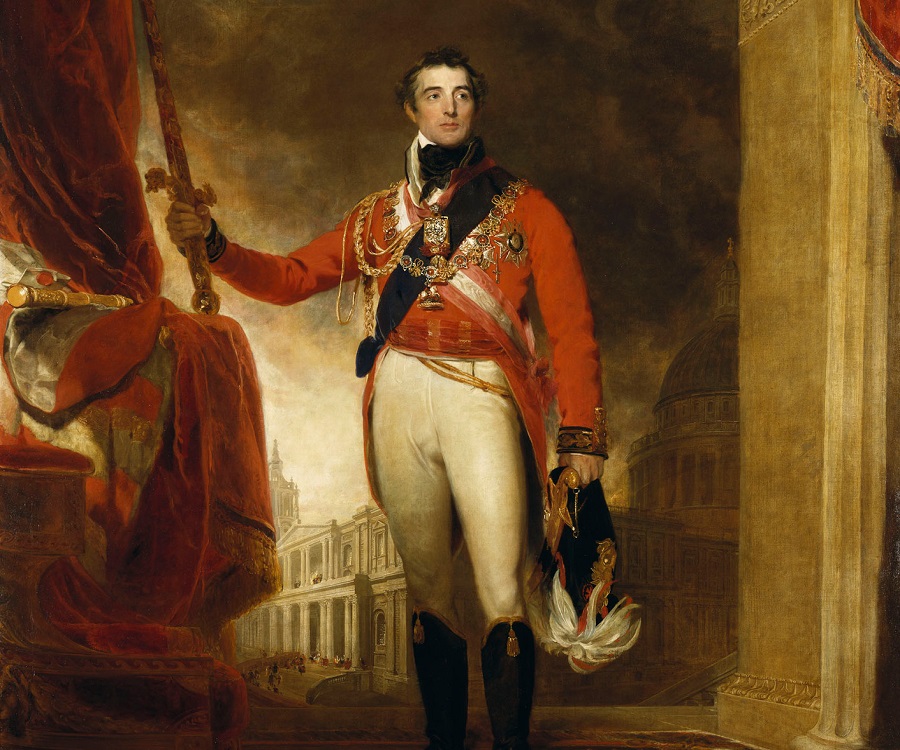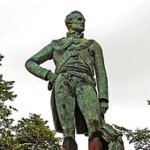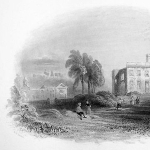Background
Arthur Wellesley was born on May 1, 1769, at 6 Merrion Street, Dublin, to Anne and Garret Wesley, 1st Earl of Mornington.

Wellington at the Battle of Salamanca (engraving after William Heath).






Arthur Wellesley was born on May 1, 1769, at 6 Merrion Street, Dublin, to Anne and Garret Wesley, 1st Earl of Mornington.
He went to the diocesan school in Trim when at Dangan, Mr Whyte's Academy when in Dublin, and Brown's School in Chelsea when in London. He then enrolled at Eton College, where he studied from 1781 to 1784. In 1785, a lack of success at Eton, combined with a shortage of family funds due to his father's death, forced the young Wellesley and his mother to move to Brussels. Until his early twenties, Arthur showed little sign of distinction and his mother grew increasingly concerned at his idleness, stating, "I don't know what I shall do with my awkward son Arthur."
A year later, Arthur enrolled in the French Royal Academy of Equitation in Angers, where he progressed significantly, becoming a good horseman and learning French, which later proved very useful. Upon returning to England in late 1786, he astonished his mother with his improvement.
In 1787, when Arthur was 18, his brother the second Earl of Mornington purchased him a commission as an ensign in the army, and he was soon also appointed aide-de-camp to the Irish viceroy. In 1790 he succeeded another brother as member of the Irish Parliament for the family seat of Trim, which he represented until 1797. Purchasing his way through the upper echelons of the army without experiencing military service, he was promoted successively to captain, major, and lieutenant-colonel between 1791 and 1793. His official income remained modest, however, and he accumulated considerable debts from his heavy gambling.
The outbreak of war with revolutionary France proved a turning point in Wesleys career. He saw active service for the first time in Flanders, in the 33rd Foot, in 1794 and 1793. On his return to Dublin, he sold his officer’s commission to pay off his debts. Only after failing to find civil employment did he decide in 1796 to go with his regiment to India, hoping to accumulate a sufficient fortune there with which to enhance his marriage prospects.
The unexpected arrival of Arthur’s eldest brother, Richard Wellesley (as the family now spelled its name), as viceroy in May 1798 enabled him to exploit his military talents to the full.
He was advised by Castlereagh to seek election as M.P. for Rye at a by-election in April 1806, in order to defend his brother’s Indian record, which he did, successfully. He later served as M.P. for Mitchell in Cornwall and Newport on the Isle of Wight. His acceptance of the office of chief secretary for Ireland in the Duke of Portland’s ministry in 1807 proved the key to his future military success. At the Convention of Paris he was appointed commander of the allied army of occupation.
Returning to Britain but reluctant to become embroiled in party politics, he was persuaded to join Liverpool’s cabinet in 1818 as Master General of the Ordnance by Castlereagh, to whom he remained indebted for securing his command in the Iberian Peninsula. He made it a precondition of accepting office, however, that he retain the right to adopt a nonpartisan approach, even to the point of remaining in office should the government resign. During his early years in the cabinet, notwithstanding his illustrious international reputation, he remained relatively inconspicuous. He assumed a more prominent role in cabinet following the suicide of his friend and patron Lord Castlereagh in 1822.
After the death of Canning, Wellington re¬sumed his army command; but following the failure of the Goderich ministry, he was summoned by George IV to become prime minister in January 1828. In the end, his ill-judged defense of the unreformed electoral system on 2 November, which was intended to clarify his own position and thereby reunite the party behind him, led to the defeat of his government in the House of Commons and to his resignation on 22 November 1830.
Wellington’s determination while in the opposition to thwart the passage of the Whig Reform Bill in the House of Lords made him unpopular with radicals, mobs of whom twice smashed the windows of Aspley House, his London home, before he had iron shutters put up (earning himself the pejorative nickname Iron Duke). After Earl Grey’s resignation in May 1832 and Wellington’s failure to form an alternative government, Wellington mustered sufficient influence over the Tory peers to enable the reform bill’s passage through the House of Lords without the threatened creation of additional Whig peers.
When the first reformed Parliament met in January 1833, Wellington and Peel determined to oppose the Whig government only if some vital principle came under attack. In 1834, during the crisis provoked by Melbourne’s resignation, Wellington became a caretaker prime minister for three weeks, also holding provisionally the offices of home secretary, foreign secretary, and secretary of war for the colonies. His magnanimous insistence that Peel, who was taking a holiday in Italy, should form the next Tory administration proved a turning point in the reconstruction of the Conservative Party. Wellington continued to serve as foreign secretary, his last great ministerial post, until the fall of Peel’s first administration in April 1835. During his tenure, he negotiated the Eliot Convention with the commanders of the rival armies in the Carlist War in Spain, putting an end to the systematic shooting of prisoners of war and providing for the periodic exchange of captives.
After 1835, Wellington retained an important consultative role as leader of the opposition in the House of Lords, but again ruled himself out of high office when summoned to form an administration by the young Queen Victoria on the advice of Lord Melbourne in 1839 - partly because of his conviction that the prime minister should sit in the House of Commons. He later served as a minister without portfolio in Peel’s second administration (1841-1846), exerting a powerful political influence and helping to secure the repeal of the Corn Laws in 1846. The fall of Peel on 29 June 1846 marked the end of Wellington’s political career; Wellington felt that he could not lead the opposition to the incoming Whig administration in the House of Lords. He opted instead to continue as commander in chief of the army (a post he had held since 1842). In this role he was criticized for failing to initiate urgently needed military reforms; but his calm and confident handling of the Chartist demonstration in London in 1848 prevented the outbreak of violence.
Wellington died of a stroke at Walmer Castle, his residence in Kent, as Lord Warden of the Cinque Ports on 14 September 1852.

Arthur Wellesley, 1st Duke of Wellington, was one of the leading military and political figures of 19th-century Britain, who first rose to military prominence in India, won successes in the Peninsular War in Spain, and shared in the victory over Napoleon at the Battle of Waterloo.
In addition, Arthur Wellesley is the recipient of numerous awards throughout his career.
There are a lot of monuments, streets, mountains, buildings and places which were named after him, including Mount Wellington, a mountain located in Otsego County, New York; Wellington, the capital city of New Zealand.
His name was given to Wellington boots, after the custom-made boots he wore instead of traditional Hessian boots.
His political attitudes were essentially those of an Anglo-Irish aristocrat who distrusted democracy and ignored public opinion. (He reportedly confided to Mrs. Arbuthnot in 1831, “The people are rotten to the core.”) A rigid upholder of the law and the constitution, he believed passionately that the defense of Britain’s privileged institutions was the best guarantee of the social order.
Wellesley greatly assisted Castlereagh in the complex diplomacy of the postwar era, opposing a punitive peace settlement and instead organizing loans to help stabilize French finances, and advocating the withdrawal of the army of occupation in 1818.
Quotations:
"The whole art of war consists of guessing at what is on the other side of the hill. "
"Be discreet in all things, and so render it unnecessary to be mysterious. "
"The only thing I am afraid of is fear. "
"Educate men without religion and you make of them but clever devils. "
In 1789, he became a Member of Parliament for Trim in the Irish House of Commons and served in the Dublin Castle.
Wellesley rarely showed emotion in public, and often appeared condescending to those less competent or less well-born than himself (which was nearly everyone). He was also a remarkably practical man who spoke concisely. His stern countenance and iron-handed discipline were renowned; he was said to disapprove of soldiers cheering as "too nearly an expression of opinion, " nevertheless, Wellesley cared for his men. Wellesley always rose early; he "couldn't bear to lie awake in bed", even if the army was not on the march. Even when he returned to civilian life after 1815, he slept in a camp bed, reflecting his lack of regard for creature comforts; it remains on display in Walmer Castle.
While on campaign, he seldom ate anything between breakfast and dinner. During the retreat to Portugal in 1811, he subsisted on "cold meat and bread", to the despair of his staff who dined with him.
He was, however, renowned for the quality of the wine which he drank and served, often drinking a bottle with his dinner (not a great quantity by the standards of his day). Following an incident when, he had been close to a large explosion, Wellesley begun to experience deafness and other ear-related problems. In 1822, he had an operation to improve the hearing of the left ear. The result, however, was that he became permanently deaf on that side.
Wellington had a "vigorous sexual appetite" and many amorous liaisons during his marriage to Kitty. He enjoyed the company of intellectual and attractive women for many decades, particularly after the Battle of Waterloo and his subsequent ambassadorial position in Paris. The British press lampooned this side of the national hero.
Quotes from others about the person
“The Duke of Wellington ought never to have had anything to do with politics.” - General Alava.
On April 10, 1806, Arthur Wellesley married Catherine Sarah Dorothea Pakenham. The couple led a very unhappy married life and spent several years living apart from each other. However the marriage produced two sons, Arthur, in 1812, and Charles, in 1813.

Garret Colley Wesley, 1st Earl of Mornington, was an Irish politician and composer.
Anne Wesley (Hill-Trevor) was the eldest daughter of The 1st Viscount Dungannon.
Catherine Sarah Dorothea Wellesley (Pakenham), Duchess of Wellington, was the daughter of Edward Pakenham, 2nd Baron Longford and the former Catherine Rowley.
Charles Wellesley was a British politician, soldier and courtier.
Arthur Richard Wellesley, 2nd Duke of Wellington, was a British soldier and politician.
William Wellesley-Pole, 3rd Earl of Mornington, was an Anglo-Irish politician.
Richard Colley Wellesley, 1st Marquess Wellesley, was an Irish and British politician and colonial administrator.
Henry Wellesley was a British diplomat and politician.
